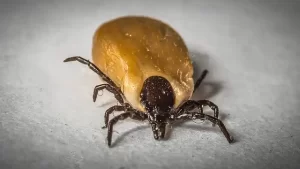Biomarkers and targeted therapy for intrahepatic cholangiocarcinoma
- Engineered Soybeans with Pig Protein: A Promising Alternative or Pandora’s Dish?
- Severe Fever with Thrombocytopenia Syndrome (SFTS): A Tick-Borne Threat with High Mortality
- Why Isolating Bananas Extends Their Shelf Life?
- This common vitamin benefits the brain and prevents cognitive decline
- New report reveals Nestlé adding sugar to infant formula sold in poor countries
- Did Cloud Seeding Unleash a Deluge in Dubai?
Biomarkers and targeted therapy for intrahepatic cholangiocarcinoma
- Red Yeast Rice Scare Grips Japan: Over 114 Hospitalized and 5 Deaths
- Long COVID Brain Fog: Blood-Brain Barrier Damage and Persistent Inflammation
- FDA has mandated a top-level black box warning for all marketed CAR-T therapies
- Can people with high blood pressure eat peanuts?
- What is the difference between dopamine and dobutamine?
- How long can the patient live after heart stent surgery?
Biomarkers and targeted therapy for intrahepatic cholangiocarcinoma.
Preface
Although rare, intrahepatic cholangiocarcinoma ( ICC ) is still the second most common primary liver malignant tumor. About 8,000 cases are diagnosed in the United States each year, accounting for only 3% of gastrointestinal malignancies diagnosed each year worldwide.
In recent decades, the incidence of ICC has increased. Some studies have shown that since the early 1990s, the incidence of ICC has increased by 14% every year.
The increase in the incidence of ICC may be due to the increase in the global hepatitis C infection rate, as well as obesity-related non-alcoholic fatty liver and non-alcoholic steatohepatitis, which are known risk factors for ICC. There are also regional differences in the risk factors associated with ICC.
For example, among ICC patients in Eastern countries, the relative incidence of liver stones, liver fluke infection, and viral hepatitis is significantly higher.
On the contrary, in patients in Western countries, ICC is more often associated with primary sclerosing cholangitis and other chronic liver diseases ( non-alcoholic fatty liver, non-alcoholic steatohepatitis, and cirrhosis ).
At present, the treatment of ICC is still difficult, because most patients with advanced disease cannot receive therapeutic surgical resection. Even in operable patients, complete surgical removal is difficult to achieve, and the recurrence rate is still high.
Therefore, ICC’s systemic chemotherapy and targeted therapy have attracted great attention. In the past ten years, understanding of the molecular and genetic basis of ICC has changed treatment methods and strategies. Next-generation sequencing has shown that most ICC tumors have at least one targeted mutation.
These advances have prompted multiple clinical trials to check for tumors. The safety and effectiveness of new therapies for specific molecular and gene aberrations. Although some clinical trials have shown encouraging results, large-scale randomized trials are still needed to further determine the potential clinical value of such treatments.
Pathogenesis of ICC
ICC is most common in chronic biliary inflammation and stasis. Therefore, patients with diseases that promote chronic cholestasis and inflammation ( primary sclerosing cholangitis, liver stones, liver fluke infection, chronic hepatitis, and cirrhosis ) are at risk for ICC.
Common gene mutations associated with ICC include KRAS, BRAF, TP53, and epidermal growth factor receptor. KRAS mutations are the most common mutations associated with ICC; however, their incidence ranges from 8% to 53%. BRAF mutations are also very common, with a reported incidence of 0-22% in ICC tumors.
Compared with wild-type tumors, patients with KRAS or BRAF mutations had a worse median survival ( 23 months and 34 months, respectively, p=0.05 ). Compared with patients with ICC tumors with BRAF mutations, the 5-year overall survival rate of patients with KRAS mutations was also worse ( 13.5 months and 23.2 months, respectively, p=0.05 ).

Recently, two main biological types of ICC have been identified: inflammatory and proliferative. Inflammatory ICC accounts for 38% of ICC and is characterized by the activation of pro-inflammatory signaling pathways through IL-10, IL-4, IL-6 and other cytokines and STAT3.
The proliferation type of ICC accounts for 62% of ICC and is characterized by the activation of oncogenic signaling pathways, especially through receptor tyrosine kinase ( RTK ).
The main types of mutations that drive RTK dysfunction are gain-of-function mutations ( EGFR ), RTK overexpression and genome amplification ( EGFR, MET ), chromosomal rearrangement, and constitutive activation of kinase domain replication.
There are several important differences between the clinical phenotypes of inflammatory and proliferative ICC. For example, proliferative ICC tumors are more likely to be moderately to poorly differentiated, while inflammatory tumors are more likely to be well differentiated.
Survival analysis of proliferative and inflammatory ICC showed that patients with proliferative ICC had a shorter recurrence time ( 15 months vs. 37 months, p=0.03 ), and a lower median survival time ( 24.3 vs. 47.2, p=0.048 ). In addition, the incidence of KRAS mutations in proliferative ICC tumors is 8%, and the incidence in inflammatory ICC tumors is 7%; the incidence of BRAF mutations is 5% in proliferative ICC tumors and in inflammatory ICC tumors. The middle rate is 2%.
Biomarkers of ICC
The development of next-generation DNA sequencing technology has changed the treatment prospects of many different types of cancer, including ICC. In fact, up to 70% of ICC tumors may have at least one targetable gene mutation, and on average, there are 1 to 2 targetable mutations for each tumor examined.

Several early small studies found that in the AT-rich interaction domain, the most common mutations in ICC include the ARID1A ( 36% ), IDH1/2 ( 36% ), TP53 ( 36% ) and MCL1 ( 21% ) genes. Common actionable mutations ( using FDA-approved drugs for treatment ) include FGFR2 ( 14% ), KRAS ( 11% ), PTEN ( 11% ), CDKN2B ( 7% ), ERBB3 ( 7% ), MET ( 7 % ), NRAS ( 7% ), CDK6 ( 7% ), BRCA1 ( 4% ), BRCA2 ( 4% ), NF1 ( 4% ), PIK3CA ( 4% ), PTCH1 ( 4% ) and TSC1 ( 4% ) Gene.
The expression of programmed death ligand 1 ( PD-L1 ) has also been reported to be present in 10–70% of ICC tumor specimens. Positive PD-L1 is associated with more aggressive ICC characteristics and worse survival rates. Although uncommon, microsatellite instability ( MSI ) has been explored as a biomarker and target for personalized ICC therapy.
Due to the rarity of MSI in ICC, precise conclusions about its incidence and prognostic impact have been difficult to explain. Available data indicate that tumor microsatellite instability (fixed defined as DNA mismatch repair protein MLH1, PMS2, MSH2, MSH6 deletion ) is not common, occurs only in a small number of ICC patients ( range 1-10% ).
Targeted therapy for ICC
Although various gene mutations have been found in ICC, the incidence of many mutations is still very low, which makes the use of targeted therapy challenging. However, for some of the more common genetic mutations, including those involving IDH1/2, FGFR, EGFR, and VEGF, early clinical trials have begun.

Isocitrate dehydrogenase
Since IDH1/2 mutations are present in about 10-20% of ICC lesions, this gene mutation has always been the target of therapeutic intervention. In a multi-center, randomized, double-blind, placebo-controlled phase 3 trial, the safety and efficacy of the mutant IDH1 inhibitor Ivosidenib was studied in patients with advanced cholangiocarcinoma who received fluorouracil or gemcitabine-based chemotherapy.
The trial included patients with all types of cholangiocarcinoma ( ie intrahepatic, hilar, distal ); however, most patients had ICC ( 89% in the treatment group and 77% in the placebo group ).
In 185 patients ( 124 in the treatment group and 61 in the placebo group ), Ivosidenib was associated with improved progression-free survival ( median 2.7 months vs. 1.4 months, p<0.0001 ) and comparable safety ( treatment Serious adverse events occurred in 30% of patients in the group vs. 22% in the control group ).
Fibroblast growth factor receptor
FGFR abnormalities are found in 10-15% of ICC tumors. FGFR is expressed on a variety of cell types and is composed of four transmembrane receptors ( FGFR1-4 ) with intracellular tyrosine kinase domains.
The binding of these FGFR receptors leads to unregulated activation of multiple cell proliferation pathways, including RAS-Raf MAPK, JAK-STAT, and PI3-AKT mTOR, leading to angiogenesis and unregulated cell proliferation.
Pemigatinib is an oral kinase inhibitor that can inhibit FGFR 1, FGFR2 and FGFR3. Several phase 2 clinical trials have tested the safety and anti-tumor activity of Pemigatinib in patients with advanced cholangiocarcinoma with FGFR rearrangement.
In one trial, of 146 registered patients, 35% had an objective treatment response, 42% died of disease progression, and 45% had serious adverse events. Pemigatinib is currently undergoing a phase 3, open-label, randomized, actively controlled multicenter trial to compare the efficacy and safety of Pemigatinib with standard treatment (gemcitabine-cisplatin) in patients with advanced or metastatic cholangiocarcinoma with FGFR2 aberration ( NCT03656536 ).
Futibatinib is a different highly selective and irreversible oral FGFR 1-4 inhibitor. Its efficacy and safety have been studied in a multi-center phase 2 clinical trial. Among 103 registered patients, 34% of patients had an objective response, and so far, the disease control rate is 76%, 73 % Of patients had serious adverse events ( ≥Grade 3 ). In another multicenter phase 3 study ( NCT04093362 ), Futibatinib is currently being compared with standard treatment ( gemcitabine-cisplatin ).
In addition, there are many other early studies that are testing the safety and effectiveness of mutant FGFR inhibitors.

Epidermal growth factor receptor
The HER tyrosine kinase family includes EGFR and HER1-4. EGFR mutations have been found in 25% of ICC tumors. EGFR is a subclass of tyrosine kinase transmembrane receptors that bind to epidermal growth factor and activate signaling pathways involved in cell movement, cell adhesion, angiogenesis, and invasion.
Several early trials to study the safety and effectiveness of abnormal EGFR and HER inhibitors ( lapatinib, erlotinib, pertuzumab, trastuzumab ) in patients with cholangiocarcinoma and other solid tumors are ongoing, but they have not yet shown a significant objective treatment response.
Immune checkpoint inhibitor
PD-L1 has been found in 10–70% of ICC tumor specimens, and its expression is related to tumor aggressiveness and reduced survival rate. The safety and effectiveness of many PD-L1 inhibitors have been tested in advanced or metastatic PD-L1 positive cholangiocarcinoma. These early trials failed to prove the exact drug-related benefits, but the preliminary results did show the potential for treatment effectiveness and safety.

Currently, there are many ongoing early trials testing the efficacy and safety of immune checkpoint inhibitors in patients with advanced MSI-ICC.
BRAF mutation
BRAF mutations occur in 5-7% of ICC. BRAF is a tyrosine kinase member of the RAS-RAF-MEK-ERK pathway ( MAPK ). BRAF mutations are associated with higher TNM staging, resistance to systemic chemotherapy, and poor survival. Many studies of targeted therapy related to BRAF-positive ICC are “barrel” studies, including many different types of solid tumors containing BRAF mutations.
Therefore, the interpretation of these data and the identification of disease-specific efficacy have always been a challenge. At present, some ongoing trials on patients with metastatic cholangiocarcinoma are underway, and the results of these trials still have to wait.

Summary
In recent decades, considerable progress has been made in understanding the molecular and genetic pathogenesis of ICC. The evolution of this knowledge has promoted the development and research of new targeted therapies for patients with advanced ICC, some of which have shown great potential related to disease progression and even survival.
These results still need to be verified by larger-scale clinical trials. These ICC patients should undergo genetic analysis to determine potential targeted therapies. In addition, like many rare diseases, more patients need to participate in clinical trials to help better determine the role, efficacy and safety of ICC targeted therapy.
references: Biomarkers and targeted therapy for intrahepatic cholangiocarcinoma.
1.Intrahepatic Cholangiocarcinoma: ASummative Review of Biomarkers and Targeted Therapies. Cancers (Basel). 2021Oct; 13(20): 5169.
Biomarkers and targeted therapy for intrahepatic cholangiocarcinoma
(source:internet, reference only)
Disclaimer of medicaltrend.org
Important Note: The information provided is for informational purposes only and should not be considered as medical advice.



